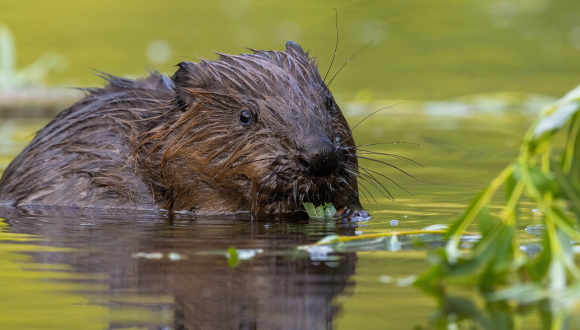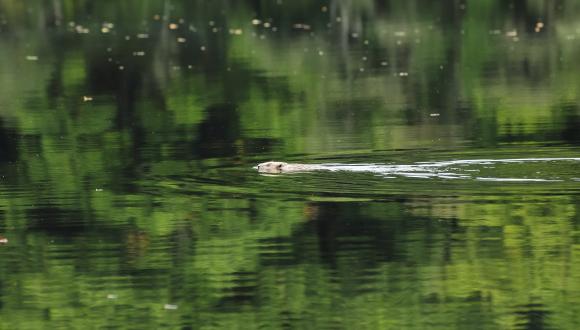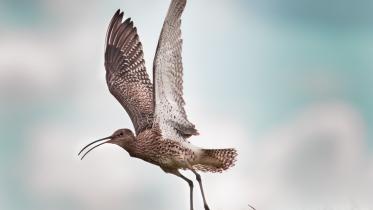SBAG Scottish Beaver Advisory Group Meeting - 25 January 2024
Battleby: Thursday 25th January 2024, 10.30 – 12.30
Attendees:
- Chair: Jill Robbie
- Jenny Bryce (NatureScot)
- Hugh Dignon (Scottish Government)
- Nadia Flaherty (Scottish Land and Estates)
- Donald Fraser (NatureScot)
- Erin Garner (NatureScot)
- Graeme Heenan (Loch Lomond and the Trossachs National Park)
- Kate Maitland (National Farmers Union Scotland)
- Alan McDonnell (Trees for Life)
- Robert Needham (Beaver Trust)
- James Silvey (RSPB)
- Juli Titherington* (Scottish Forestry)
- Alan Wells (Fisheries Management Scotland)
*attended virtually
Apologies
April Armstrong (Confor), Doreen Bell (Scottish Water), Roisin Campbell-Palmer (Beaver Trust), Catherine Damen (COSLA), Hazel Forrest (Scottish Wildlife Trust), Rachel Helliwell (Centre of Expertise for Waters), Kenny Kortland (Forestry and Land Scotland), Scot Mathieson (Scottish Environment Protection Agency), James Nairne (Scottish Beaver Group, Helen Senn (Royal Zoological Society of Scotland), Helen Taylor (Royal Zoological Society of Scotland), Jonathan Willet (Cairngorms National Park Authority)
1. Welcome and introductions
The chair opened the meeting by welcoming attendees to Battleby.
2. Update from chair on recent site visits and welfare meeting
The chair provided an update on recent site visits to a range of sites facilitated by James Silvey (RSPB) on 23 November and Kate Maitland (National Farmers Union Scotland) on 4 December. The site visit to the floodbank breach was useful to see the extent of the damage. Discussions are ongoing with those affected and within Scottish Government, SEPA and NatureScot as to what actions can be taken to reduce the risks to farm businesses.
The chair advised that a meeting to discuss welfare and the Scottish Animal Welfare Commission recommendations took place on 7 December, as agreed at the previous meeting. An informal note was circulated to the group following the meeting.
3. Minutes of previous meeting – 26th October 2023
The minutes of the previous meeting were approved as an accurate record.
4. Action points and matters arising
August AP 2: All sub-groups to aim to meet before the next SBAG meeting on 26th October and advise the secretariat of the list of those to be invited to access the SBAG sharefiles. Discharged. All subgroups have now met. Updates provided at this meeting.
August AP 6: NatureScot to review the ToR to ensure consistency. Outstanding. Some ToRs still to be received.
August AP 7: SBAG to approve the sub-groups ToR. Outstanding. Some ToRs still to be received.
October AP 1: NatureScot to include a link to the main share file in all correspondence to the group. Discharged.
October AP 2: NatureScot to arrange a separate meeting to discuss the SAWC recommendations and response, inviting all SBAG members and technical experts. Discharged. Meeting took place 7 December 2023.
The group considered how to encourage carcass returns with a view to evidencing that best practice is being followed where lethal control is exercised. A condition of licences issued since August 2023 is that carcasses should be made available for collection and where it is not possible for them to be retrieved, for the licence holder to report this to NatureScot within 2 working days of the animal being shot.
Clear communication of expectations, trust and confidence in the system were highlighted as keys to successfully managing welfare issues and compliance and to increasing the rate of carcass returns.
October AP 3: Scottish Government to discuss impact of beaver activity on SG funding with RPID colleagues and ask about emerging strategy in this area. Discharged. It was clarified that while RPID has no intention of writing a beaver impacts clause into every contract, they would not seek penalties in relation to impacts caused by beavers.
October AP 4: NatureScot to circulate the strategy progress spreadsheet via email, with comments to be sent to the SBAG admin inbox. Discharged.
October AP 5: NatureScot to circulate a list of who has been invited to each sub-group to the full group for consideration, noting that sub-group and SBAG membership may differ and that SBAG will have oversight of all sub-group reporting. Discharged.
October AP 6: CNPA to circulate an analysis of the consultation feedback. Discharged.
October AP 7: All to contact NatureScot with suggestions for potential sites, with NatureScot to respond with why or why not these sites are under consideration. Discharged. Assessment of suggested sites circulated 15 December 2023.
Trees for Life queried the rationale behind Muir of Dinnet, Taynish and Tentsmuir not being actively considered for translocations.
NatureScot advised that the potential of NNRs for translocations will remain under review and that work is ongoing to identify sites within public ownership in the national parks and National Forest Estate. NatureScot need to balance resources across a range of strategy actions.
NatureScot advised of the reasons why there are not currently proposals for translocations to Taynish and Tentsmuir, noting that at present the benefits were not assessed to outweigh the other considerations in these cases.
Fisheries Management Scotland advised of concerns regarding the poor status of salmon populations on the River Dee with regard to consideration of Muir of Dinnet and suggested close engagement with the fisheries sector if that site were to be taken forward.
There was discussion of specific stakeholder interests, particularly ministerial interest in prioritising areas where beavers are unlikely to establish on their own (Scottish Government), concerns regarding actively introducing beavers into highly productive agricultural areas (National Farmers Union Scotland) and a request to consult on the impact of new translocation sites with regard to forestry grants and strategic planning (Scottish Forestry).
October AP 8: NFUS to speak to NatureScot (Jenny Bryce) and Scottish Land and Estates (Nadia Flaherty) regarding specific examples of licensing issues. Discharged.
NatureScot advised of a planned review of species licensing in the round, an interest in collecting feedback on how the process can be improved (particularly for renewals) and future shift to an online licensing system.
National Farmers Union Scotland (NFUS) and Scottish Land and Estates offered to facilitate a meeting between licence holders and NatureScot to share their experiences with the system, which NatureScot welcomed.
January AP 1: NFUS (Kate Maitland) and Scottish Land and Estates (Nadia Flaherty) to arrange a session for licence holders as a means of NatureScot providing updates and for licence holders to feedback to NatureScot (Jenny Bryce and Donald Fraser) on the licensing process.
October AP 9: RZSS to follow up in writing with detail of the research to supplement the Knapdale report and inform future translocation considerations. Discharged. Circulated to the group on 15 December 2023.
The group agreed to discuss this matter at a future meeting when a Royal Zoological Society of Scotland representative is in attendance and noted that the detail is likely to be covered in the Research and Innovation sub-group.
January AP 2: Discussion on genetic research and population management to be scheduled for a future meeting with RZSS in attendance.
October AP 10: NatureScot to send placeholders for 2024 meeting dates, with details to follow. Discharged.
October AP 11: NatureScot to send a placeholder for a site visit on 24 April 2024, with details to follow. Discharged.
5. Sub-group updates
All sub-groups have now met at least once since the last SBAG meeting in October.
Fish and Fisheries (Chaired by Alan Wells, Fisheries Management Scotland)
Alan Wells provided an update on the Fish and Fisheries sub-group, which met on 23 November 2023 and then again on Tuesday 23 January 2024. The group has now agreed its Terms of Reference and membership.
The sub-group plans to meet again soon and will start prioritising the areas of interest, with a likely focus on the pass-ability of dams and a beaver dam assessment tool.
Management and Mitigation (Chaired by Roisin Campbell-Palmer, Beaver Trust)
NatureScot had been provided with an update on the Management and Mitigation sub-group which was relayed to the group.
The group had met on Tuesday 16 January. The Terms of Reference are not yet agreed and will be discussed more fully at a future meeting. The group discussed the strategy actions assigned to the group which cover the themes of developing best practice, supporting mitigation delivery and knowledge exchange.
The sub-group discussed topics of interest including:
- the need for overlap with the other sub-groups
- cross border linkages and learning
- how to communicate outcomes and outputs – linking with Communications sub-group
- structure of future meetings (focus on impact versus sector).
The sub-group sought suggestions for topics for future meetings with a proposal to focus on the management of riparian woodland at the next meeting. The group have requested presentations on existing information on mitigation measures (costs, evaluation, data collection, licensing, decision support) to inform discussions and knowledge sharing (including from other jurisdictions).
Research and Innovation (Chaired by Aileen Mills, University of Newcastle)
NatureScot had been provided with an update from the Research and Innovation sub-group which was relayed to the group.
The sub-group has identified the core membership reflecting different areas of research expertise and will call on others as necessary. There is some cross-over with the Fish and Fisheries sub-group with one member also being a member of that group. The group will also consider linkage with the English Research group that has recently been formed. They have also considered the relevant actions as set out in the strategy and the group’s areas of interest. An initial action will be to list/update on ongoing research.
Communications (Chaired by Sarah Robinson, Scottish Wildlife Trust)
NatureScot provided a summary of the Communications sub-group’s meeting on 23 January.
It was requested that the main SBAG contact for each organisation be copied into emails regarding sub-group business so they stay informed of key developments.
The sub-group considered the most appropriate website for hosting or signposting information and how best to use existing publicly available information. It was proposed that the sub-group should discuss this further and bring a short paper to the full SBAG for consideration. Issues to consider were the governance of the content, the accessibility to different stakeholders and resourcing, amongst others.
Members of the sub-group have agreed to draft a communications strategy and the Beaver Trust advised that they are hiring an Education Officer, which may be able to provide support.
Moving forward, the Communications sub-group plan to meet quarterly.
6. Flooding discussion
NatureScot advised that discussions regarding flooding and its impacts have been continuing following Storm Babet in October, flooding in Tayside and, more recently, Storms Isha and Jocelyn. There is ministerial interest in this area and beavers have been part of these discussions. Scottish Government have provided some financial support for flood bank repairs. It was acknowledged that the issues are complex with multiple factors involved including the risks from beavers, the frequency and intensity of flood events, river modifications and management.
NatureScot acknowledged that while licensing can play a role in reducing the risk to floodbanks, in the longer term there needs to be more fundamental evaluation of the risks of farming in high flood risk areas. The group noted that investment in repairing flood banks in the same locations is not sustainable.
NFUS raised concerns about evidence of beaver damage not being acknowledged. NatureScot accepted that beaver activity can contribute to flood bank damage but noted that causation is difficult to prove and that other factors are likely to be involved.
The group considered the impact of climate change on the frequency and severity of flooding, the importance of wide engagement in developing solutions and explored queries and issues around funding for landscape scale projects such as flood bank realignment.
Scottish Government invited NFUS to discuss concerns regarding flooding and beaver impacts with ministers.
7. Translocation updates
Forestry and Land Scotland (FLS) were unable to attend but submitted an update to the chair advising that seven beavers have been successfully translocated to Knapdale and Tay Forest Park since their licence was issued. All are settling in well so far and supportive feedback has been received from local communities and neighbours. In Glen Affric, Trees for Life are leading a further consultation on proposed translocations to FLS land. FLS is working to identify additional sites for future translocations.
RSPB advised that another pair was translocated to the Loch Lomond NNR in November 2023 and appear to have settled at the release site so far. A family had been translocated to the site in January 2023 but have since moved to another location in the local area, hence enabling the original release site to be used again.
Cairngorms National Park were also unable to attend but submitted an update to the chair advising that two pairs of beavers were released on 18 December, one each at Rothiemurchus and Wildland Cairngorms. All are healthy and behaving normally and have remained at the release sites. Following release, they maintained a staff presence on Rothiemurchus to manage disturbance but this has been discontinued.
Trees for Life advised that a new Beaver Management Officer for Strathglass is now in post and engaging with stakeholders and subject to a successful application, monitoring beaver activity. Trees for Life are also managing the ongoing engagement and are using a third party to facilitate focused conversations regarding the proposals for release in Glen Affric.
RSPB advised that they are hosting meetings in late January and in March (along with Loch Lomond and the Trossachs National Park) for landowners and land managers who are interested in hosting a beaver translocation.
8. Attendance and representation
The group reflected on attendance and representation at SBAG meetings, referring to the ToR and governance discussions during Strategy development, and considered whether changes are needed. It was noted that infrastructure interests are not well represented in the main group but do attend the Management and Mitigation subgroup. All were otherwise content that the existing membership afforded the opportunity to attend.
The group agreed to alternate between online and in person meetings following the April meeting and site visit, which may help boost attendance.
9. AOB
NFUS requested an update on water gate installations. NatureScot advised that a gate has been installed on the Baikie Burn with a camera to monitor beaver behaviour and that fish presence will also be checked annually following installation. For other potential gate sites, work is underway to identify current fish use of the waterways and those results will inform any decisions taken.
RSPB requested a breakdown of the management and mitigation budget. NatureScot agreed to provide this.
January AP 3: NatureScot to provide a breakdown of the management and mitigation budget in April 2024 covering 2023/24 spend.
Loch Lomond and the Trossachs National Park requested an update on the Environmental Standards Scotland report into Habitats Regulations Appraisal (HRA), application and monitoring and mitigation plans. NatureScot advised that the focus of the report was with regard to NatureScot processes for ensuring that monitoring and mitigation measures for translocations are assured ahead of a licence being issued. NatureScot advised that internal guidance has been revised and that that further steps have been taken to set out the measures in place at the time of translocation as was the case for the Cairngorms National Park Authorities licence for the River Spey. The ESS report has subsequently been concluded.
Summary of outstanding and new actions
August AP 6: NatureScot to review the ToR to ensure consistency.
August AP 7: SBAG to approve the sub-groups ToR.
January AP 1: NFUS (Kate Maitland) and Scottish Land and Estates (Nadia Flaherty) to arrange a session for licence holders as a means of NatureScot providing updates and for licence holders to feedback to NatureScot (Jenny Bryce and Donald Fraser) on the licensing process.
January AP 2: Discussion on genetic research and population management to be scheduled for a future meeting with RZSS in attendance.
January AP 3: NatureScot to provide a breakdown of the management and mitigation budget in April 2024 covering 2023/24 spend.







